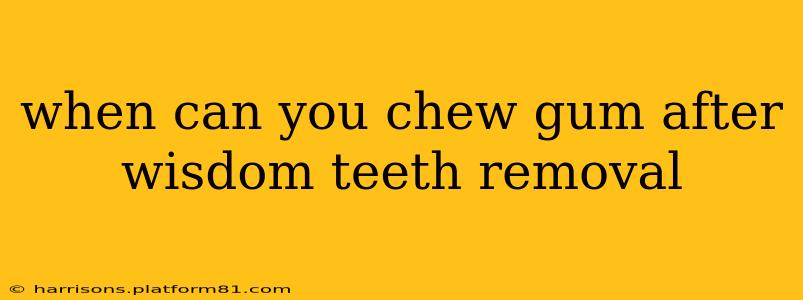Having your wisdom teeth removed is a significant oral surgery, and recovery requires careful attention to detail. One common question patients have is regarding when they can resume chewing gum, a seemingly simple act that can significantly impact healing. The answer, unfortunately, isn't a simple one-size-fits-all. It depends heavily on your individual healing process and your surgeon's specific instructions.
Understanding the Healing Process After Wisdom Teeth Extraction
After wisdom teeth removal, your mouth needs time to heal. The extraction sites are essentially wounds that need to close properly to prevent infection and complications. Chewing gum, even seemingly gentle chewing, can dislodge blood clots, leading to:
- Dry Socket: This is a painful condition where the blood clot protecting the extraction site is lost, exposing the underlying bone and nerve endings. This is a serious complication that requires immediate medical attention.
- Infection: Chewing gum can introduce bacteria into the extraction site, increasing the risk of infection.
- Delayed Healing: The constant pressure and movement from chewing can impede the natural healing process, prolonging your recovery time.
How Long Should I Wait?
Generally, you should avoid chewing gum for at least 2-3 weeks after wisdom teeth extraction. This is a conservative estimate, and your surgeon might recommend a longer period depending on the complexity of the procedure and your individual healing progress.
Some surgeons might even recommend avoiding chewing gum for up to a month, especially if stitches were used. The key is to follow your oral surgeon's post-operative instructions meticulously. They will have assessed your specific situation and can provide tailored advice.
What About Other Foods?
While chewing gum is a specific concern, it’s essential to be mindful of all food and drink choices during recovery. In the initial days after surgery, focus on soft, easily digestible foods like:
- Yogurt
- Applesauce
- Mashed potatoes
- Scrambled eggs
- Soups
Gradually introduce firmer foods as your healing progresses. Always avoid anything that requires excessive chewing or could put pressure on the extraction sites.
What if I accidentally chew gum before I'm supposed to?
Don't panic if you accidentally chew gum before the recommended time. However, if you experience any sharp pain, increased bleeding, or any other unusual symptoms, contact your oral surgeon immediately.
What are the signs of a dry socket?
Recognizing the symptoms of a dry socket is vital. Common signs include:
- Severe, persistent pain beginning 2-3 days after surgery.
- A bad taste or odor in the mouth.
- An empty socket (visible bone).
If you experience these symptoms, seek medical attention immediately.
Can I chew gum after the pain is gone?
Even if the pain has subsided, it doesn't automatically mean your sockets are fully healed. Wait until your surgeon gives you the all-clear before resuming normal chewing habits, including chewing gum.
How can I prevent dry socket?
Careful adherence to post-operative instructions is vital in preventing dry socket. These instructions often include avoiding straws, smoking, and vigorously rinsing the mouth. Gentle rinsing with salt water may be advised.
In conclusion, patience and careful adherence to your dentist's instructions are key to a successful recovery after wisdom teeth removal. While the desire to chew gum might return sooner than you’d like, prioritizing proper healing is paramount. Remember to always consult your oral surgeon if you have any concerns.
